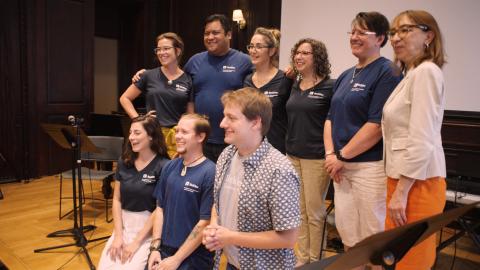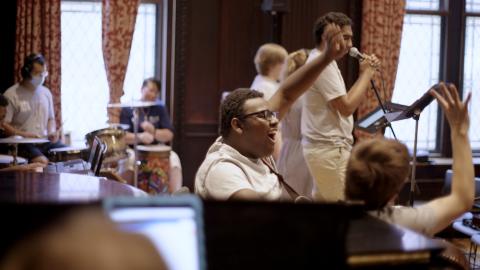Our History

The Berklee Institute for Accessible Arts Education is dedicated to increasing opportunities for individuals with disabilities in all aspects of performing and visual arts education.
Once an organization that served only the local Boston community, the Berklee Institute for Accessible Arts Education is now recognized by the field as the international leader in arts education for people with disabilities.
The Berklee Institute for Accessible Arts Education has grown a great deal over the years. We continue to develop and offer new programming, new professional development opportunities and resources, and new ways for leaders in the field to convene and connect.
We are extremely proud of our team of educators, administrators, and consultants. These individuals are deeply dedicated to our mission. They work hard to make sure that our classes, programs, content, and initiatives are the very best that they can be.
Key events in our organization’s history are listed below:
2007
Boston Conservatory Program for Students on the Autism Spectrum begins, with private instrument and voice lessons for participants with autism.
2013
First annual conference, Teaching Music to Students on the Autism Spectrum, is held at Boston Conservatory.
2014
The two Graduate Programs in Music Education and Autism begin at Boston Conservatory. We offer a Master of Music in Music Education with a Concentration in Music and Autism, and a Graduate Certificate in Music Education and Autism.
2015
One of our most popular programs, the Music Class for Young Children, begins. Young participants come together with their caregivers to begin developing musical skills and learning about music.
Our chorus, the Inner Harmony Ensemble, begins. Participants learn how to be a part of a musical ensemble as they rehearse, create, and perform, all while developing their instrumental and vocal skills.
2016
Our cutting-edge iPad Ensemble begins. Participants create and perform music using iPad apps and other handheld technologies.
Boston Conservatory and Berklee College of Music legally merge. The merger paves the way for the creation of the Berklee Institute for Arts Education and Special Needs.
2017
The Berklee Institute for Arts Education and Special Needs is launched, with a gala event featuring Delfeayo Marsalis and Matt Savage.
Our Rock Band Ensemble begins. Participants learn and perform their favorite rock and pop songs, and work together as a band.
2018
We changed the name of our annual conference to the ABLE Assembly: Arts Better the Lives of Everyone.
The Day Sessions: ABLE Summer Music Program begins. This week-long summer music day camp gives musicians with disabilities the opportunity to explore a range of musical offerings, such as ensembles, drumming, and music technology. Daily clinics by musicians with disabilities are a highlight of the schedule.
The Leadership Network for Arts Education and Special Needs begins convening. Working together to move the field of arts education for people with disabilities forward, members of this group share best practices, engage in peer learning, and collaborate on a wide range of projects.
The Daytime Moon Creations Theater Program begins. Participants explore the world of acting, improvisation, and playwriting while developing creative expression through theater games and performances with their classmates.
The ABLE Snapshots Blog launches. Arts educators share teaching strategies, class materials, and lesson ideas for teaching the arts to disabled participants.
2019
Our Introduction to Musical Instruments Class begins. Participants learn about different musical instruments, begin to study the recorder, and develop music literacy skills.
2020
Our Arts Education Programs continue during the COVID-19 pandemic, with remote instruction taking place over Zoom and other web conferencing platforms.
We launch the ABLE Arts Resource Center, an online searchable database of resources for arts educators to support them in teaching participants with disabilities.
Our Ukulele Ensemble begins. Participants learn to play the ukulele, as they develop their group performance skills.
2021
Our Bucket Drumming Class begins. Participants play paint buckets as percussion instruments. They develop their motor skills and hand/eye coordination, and they learn to play music with others.
Our Music Technology Class begins. Participants learn how to create, arrange, and manipulate music using various software programs, including GarageBand, Ableton Live, and more.
ConnectABLE, the permanent virtual arm of our Arts Education Programs, is launched. Participants from around the world take lessons, classes, and ensembles with us, using Zoom and other web conferencing technologies.
The Nurturing Leaders Program is launched with its first cohort of interns. This career development program provides some of our adolescent and young adult participants with the opportunity to learn career readiness skills and work in paid internships.
The International Arts Education and Disability Justice Exchange begins convening. In their quarterly meetings, members of this group share best practices and develop collaborative projects.
Our Digital Learning Series of free recorded workshops for educators begins, providing valuable professional development resources.
We hold our first ABLE Conversation Symposium, an event that encourages attendees to explore new perspectives and move the conversation in the field forward through keynote presentations, small group discussions, and a final sharing and synthesis.
2022
The Leadership Network for Arts Education and Special Needs changes its name to the Leadership Network for Accessible Arts Education.
Our Music History Class begins. Participants learn about the lives and works of composers who represent different historical periods, musical styles, and world cultures.
The ABLE Voices Podcast launches. Artists with disabilities are guest hosts of the podcast, where they interview disabled artists and arts educators.
Our organization changes its name to the Berklee Institute for Accessible Arts Education.

